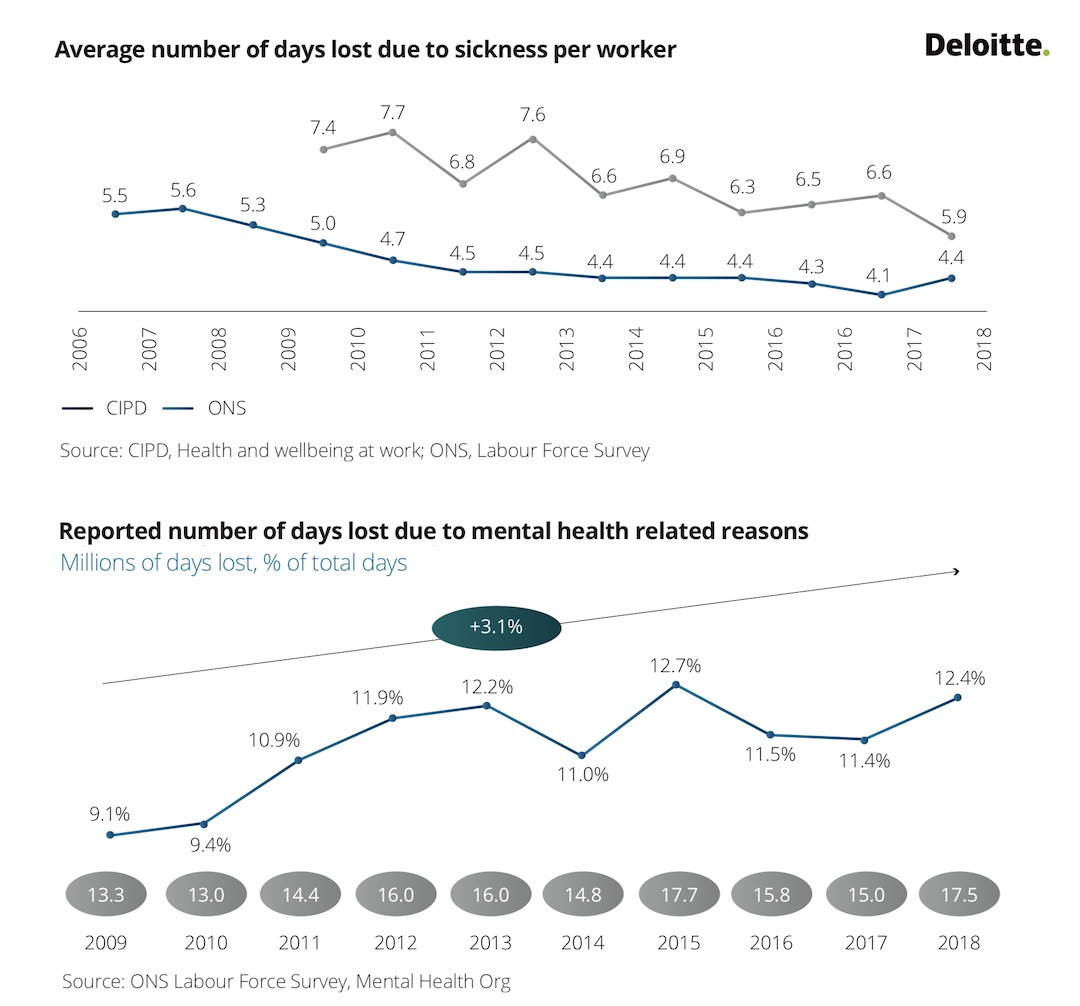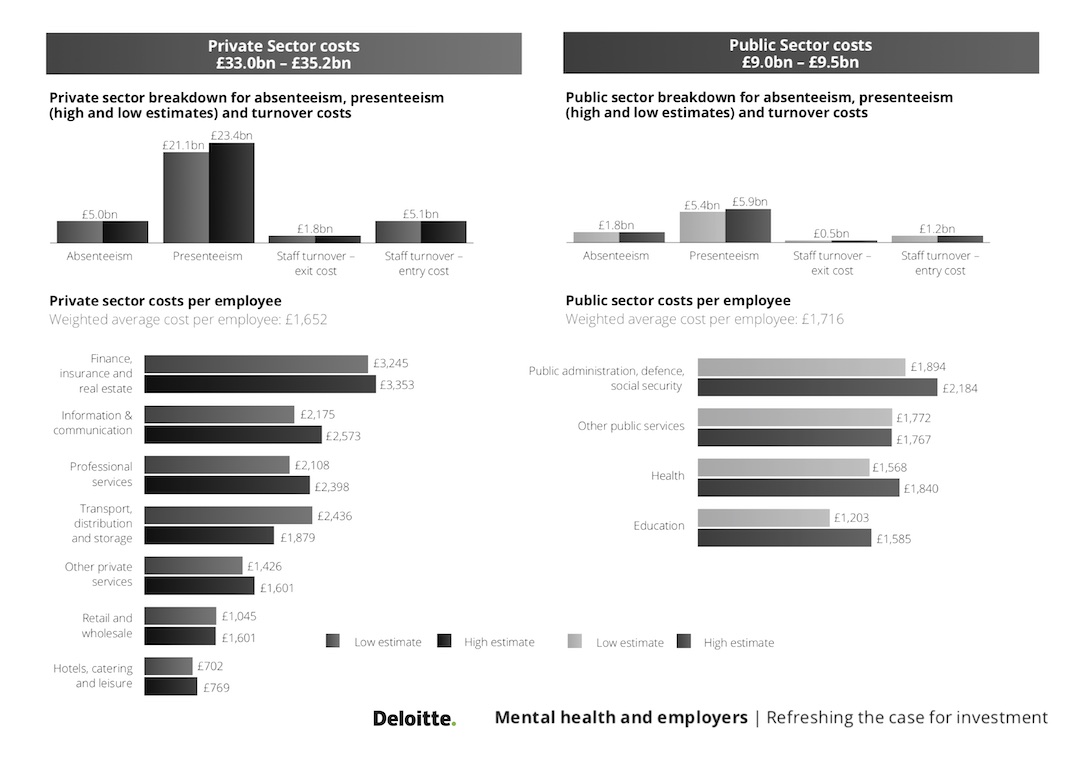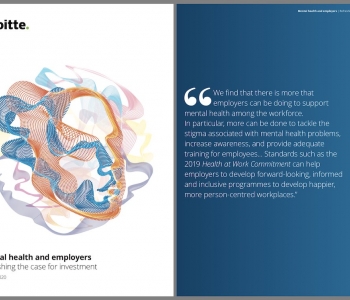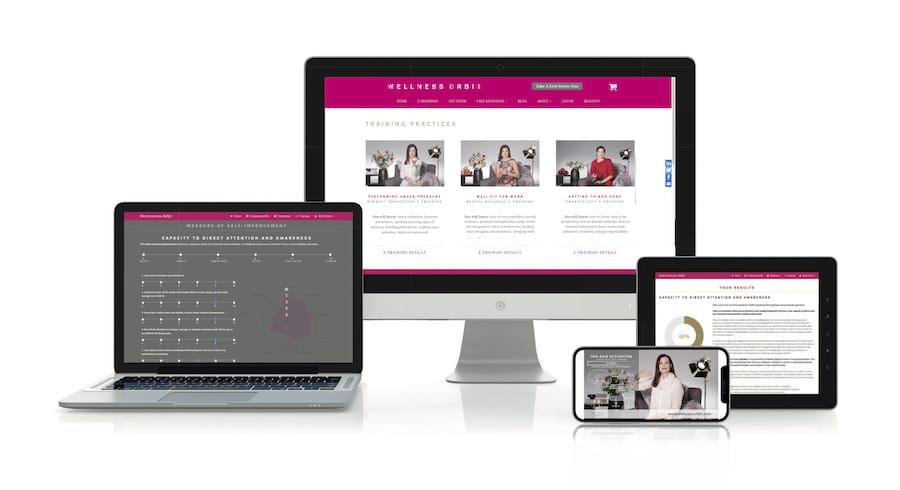The proactive mental wellness approach for all employees has the best ROI
The overall costs of poor mental health at work have again increased in the UK, according to a new report by Deloitte.
In 2017, Deloitte UK published research that explored the benefits to employers of providing help for employees with their mental health in the workplace. Now, Deloitte has updated its initial analysis to look again at the overall costs of poor mental health to UK employers. What they found was a cost increase of 16% to employers, now costing up to £45 billion (up from £37 billion in 2016) annually.
According to the research report, only 9% of all employees surveyed (and 13% of all managers surveyed) have attended training that focused on mental health. The research made clear that there is a real and positive case for investment in mental health by employers.
MENTAL WELLNESS IS AN EXCELLENT INVESTMENT
Deloitte found that on average, return on investment (ROI) into mental health was £5 gained for every £1 spent, up from the £4 to £1 return identified back in 2017.
It was clearly shown that the best ROI is found in proactive training that can secure excellent mental wellness for all of your employees. When such a proactive approach is made workplace-wide, it can demonstrate ROI up to 10,8.
For excellent ROI, you need to change the workplace culture that rides on the waves of positive stress and where employees and leaders are burnout prone, towards a more sustainable and well-being-focused culture.
Work ethics that actively support mental wellness are the foundation of productivity and employee engagement.
PRESENTEEISM AS THE MAIN FACTOR OF MENTAL HEALTH COST
The new report clearly shows the increase of presenteeism – when people go to work despite feeling incapable of working with their head (this problem is present in all white-collar jobs). Presenteeism is common among all performing professionals, managers, and administrative workers alike; it is also seen across sectors from IT and banking to educational jobs).
Deloitte states: "Most notably, there has been a rise in presenteeism, where individuals choose to attend work despite poor mental health but are unproductive in the work they do."
The data in the Deloitte report reveals that the overall number of sick days taken per employee fell from 5.5 to 4.4 between 2006 and 2018 (see the graph below), while the amount of time lost due to different mental health problems at work went up.

We speculate that part of the fall in sick days may come from the fact that most employees are now more aware of the need to keep their physical bodies well. However, this is only part of the actual wellness agenda.
Most workplaces still fail to train the minds of their employees and prevent mental health issues. It is no wonder, as the systemic and applicable proactive mental wellness approach has been missing. Until the approach to mental fitness in the workplace is systematic, mental health problems will keep piling up.
Wellness Orbit is the mental wellness pioneer that developed the world's first fully digital mental wellness gym for your team. It was possible due to the excellent professional skills and research carried out by psychiatrist Dr. Helena Lass, who is our trainer and leader of the global mental wellness revolution.
LACK OF INTRAPERSONAL SKILLS AS THE FUNDAMENTAL PROBLEM
The fact is that the total lack of intrapersonal skills leaves employees, business leaders, and even entrepreneurs vulnerable to stress, burnout, and even more serious mental health issues.
People are spending more and more unproductive hours at work when they are not feeling mentally well, rather than taking time, which is again due to the lack of intrapersonal skills. According to the Deloitte report, rather ironically, presenteeism is actually costing bosses more than it would if staff members took a day off to get well again. This doesn't surprise us at all. But it should surprise all those who still haven't invested in securing the mental wellness and mental fitness of their employees.
WHAT IS THE COST OF POOR MENTAL HEALTH?
The total annual mental health cost of factors such as sickness, lost productivity and higher staff turnover among staff members to private sector employers vary between £702 (low estimate; hotels, catering and leisure sector; compared to £497 from 2016 report) and £3,353 (high estimate in finance, insurance, and real estate sector; compared to £2564 from 2016 study) and in the public sector between £1,203 (low estimate; education sector) and £2,184 (high estimate in public administration, defense, social security sector).

In the private sector, costs related to mental health problems have clearly been growing, while in the public sector, the same costs have stayed the same compared to 2017.
Deloitte stated that a range of factors has contributed to a reported increase in cost, including the following: presenteeism, burnout, and an increase in wages during this period. It is probably the case that in the public sector, wages have been more stagnant compared to the private sector, where the lack of a highly qualified workforce is obvious.
There is one more thing worth taking note of. Deloitte also found, "that the costs to employers of poor mental health are disproportionately high among young employees (aged 18 to 29 years old), at 8.3% of average salary (£ 1,723) compared to an average across all age groups of 5.8%."
HOW CAN YOU TURN AROUND THE MENTAL HEALTH PROBLEMS IN THE WORKPLACE?
Workplace wellness isn’t the sole responsibility of the employees; it requires a partnership between employers and employees.
A good place to start is to shift the focus away from illnesses and reactivity and focus instead on a proactive mental wellness approach that is easily accessible for employees. Here, the Wellness Orbit e-trainings are perfect for your team(s) as they can be accessed online 24/7 regardless of geographic location and used whenever an employee feels stuck or has a spare moment for self-training in between different work tasks.
Wellness Orbit’s pricing is excellent and allows ROI to be well above £10 for every £1 invested. We have aimed to do the impossible – merge the professional quality of pieces of training with easy and affordable access. This is only possible through the fully digital mental wellness gym training.
THE PROACTIVE MENTAL WELLNESS APPROACH IS VITAL FOR EVERYONE ON YOUR TEAM
Our dream is to keep the cost of the training per participant as low as possible to allow all workplaces to secure mental fitness and tackle different mental health problems proactively.
Our first years on the market have demonstrated that the knowledge about the existence of the proactive mental wellness approach travels relatively slowly. Today, you have the power to help us change that by sharing our posts.
No one should have to suffer from stress, burnout, or mental health issues in today’s workplace. Preventing problems needs to start when people are well. The good news is, Deloitte has just proved to you that mental wellness in the workplace is an excellent investment.
To keep your team vital and healthy, act now and invest in your team's mental wellness e-training today.
Conclusions
By leaving this page and doing nothing, there is no change. Can you really afford to lose £702 to £3,353 per employee? You may silently think that for my team this sum is different, but have you calculated it? If it is, the good news is – it makes the ROI of mental health intervention even better.
We are sure that the actual sum from the lack of mental wellness may surprise you when you take the time and calculate it. For this, you need to answer the following.
Do you know the cost of:
- Presenteeism for your team?
- Low engagement due to the lack of intrapersonal skills?
- Stress and burnout among your top players?
- Mental health sick leaves?
We are sure that Deloitte's mental health at work study pointed out conservative numbers as they didn't look deeply into the problems that stress causes, such as low employee engagement, lack of focus, toxic work relations, etc.
As you now are aware of the data, the real question is: What actions do you plan to take to keep your team mentally well and fit for work?
This blog post is written by Kaur Lass



